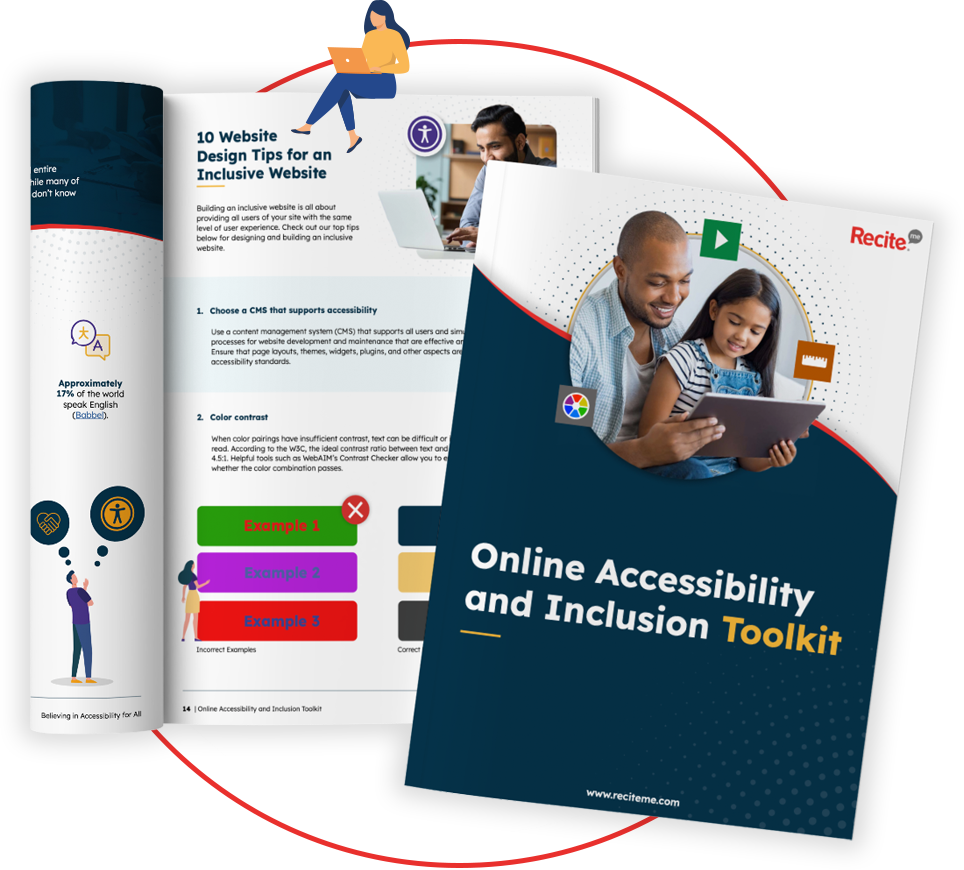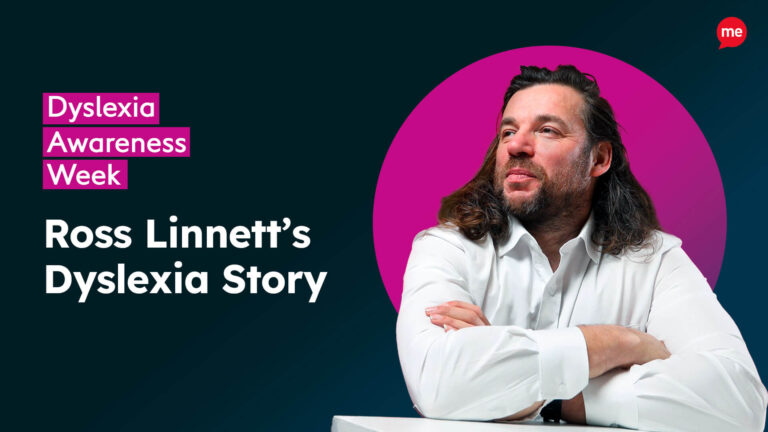Hello, my name is Daniel Cobb and I found out I had Developmental Coordination Disorder (DCD), also known as Dyspraxia at the age of 43. Dyspraxia is a common neurodevelopmental condition that affects fine or gross motor coordination in children and adults.
We are living in a fast-moving digital world where a lot of our lives are lived out online. However, a common difficulty experienced by dyspraxics is the reading and processing of information on a screen whether that be a tablet, phone, laptop, or computer.
Allow me to share with you my story, my struggles, and my journey to support organisations with diversity and inclusion throughout recruitment process into everyday working life.
My story
If you look back at my life, on paper I have been very successful. At school, I did well in my GCSEs and A-Levels, I went to University and obtained a BA Hons Degree and a MSc. I also have had a successful career working in IT sales for a market-leading IT company, got married and have had two lovely children.
However, what it does not highlight are the significant challenges I have faced throughout my life. As a child I was always falling over and covered in bruises and cuts, I constantly bumped into things, learning practical skills such as doing up buttons, tying shoelaces, learning to ride a bike, playing ball games were all very challenging for me.
I also found social interaction difficult and struggled with new situations or learning a new task. As, an adult I have experienced challenges with time management, learning new work tasks and processes and am easily overwhelmed when I have lots of things to complete.
I also frequently misplace things such as keys, wallets, headphones which as you can imagine is very frustrating. I am also very disorganised, and I always have the messiest desk in the office. Also, it can take me longer to complete things and requires additional effort to ensure I perform at a level that I believe is comparable to my colleagues.
Likewise, I have always had the feeling of being different, whether that was in the way I experienced things differently, or through thinking differently. There were also the unwanted travel companions that have followed me throughout my life – namely low self – esteem, anxiety, and depression. Low self-esteem and anxiety have always been constant companions and when things have gotten too difficult to manage it was joined by depression.
Over the years I have had numerous episodes, interestingly, not once did the medical profession want to investigate why I kept experiencing severe bouts of anxiety and depression. Matters came to a head back in 2017 when following another significant episode, I decided to investigate why this kept happening.
In the past, it had been suggested the challenges I had experienced throughout my life could be explained by something called dyspraxia. However, as I felt at the time to be doing ok I did not want to explore it further. I though now started to look into what dyspraxia was.
The internet was invaluable as I discovered there was, in fact, reams and reams of information about dyspraxia including the symptoms and characteristics of someone who has dyspraxia and the potential causes of it. The more I read about it, the more it sounded like dyspraxia could be the explaining factor behind all the difficulties I had experienced during childhood and into adulthood.
During my research, I came across The Adult Developmental Coordination Disorder / Dyspraxia Checklist which had been created by Amanda Kirkby and her team at The Dyscovery Centre, University of Wales. I completed the checklist and it was as if it was describing word for word the exact difficulties and challenges, I had experienced all my life – from childhood into adulthood.
The outcome of completing the checklist was that it indicated it was more than likely I had Developmental Coordination Disorder / Dyspraxia. At this point, I was so determined to see this to the end, and I decided I needed to get a full diagnosis.
I realised very quickly the only way to get a diagnosis was to go private, as I was an adult the NHS would not be able to help. As I was fortunate to have the financial means to pay for a private diagnosis, I was able to quickly self-refer myself to Dyspraxia UK.
The outcome of the diagnostic assessment was that the results were consistent with someone who has dyspraxia. Hearing this and seeing it down on paper was a lightbulb moment for me. I also felt a sense of euphoria and some ways of excitement.
It instantly provided me with answers as to why I had struggled all my life and why I had always felt I was different from my peers. It also explained why anxiety and depression had been constant companions throughout my life. It was quickly replaced by frustration and in some ways, grief as well. I was frustrated about why it had taken me until I was 43 years old before I was diagnosed with DCD / Dyspraxia and I was grieving for what my life could have been like instead.
Very quickly I realised that things were not going to change. It was not as if I could take medication to help and cure the dyspraxia. It was clear to me that DCD /Dyspraxia was part of my makeup and was what made me as a person. I also learned to perform and fulfil my potential especially when in work, specific adjustments needed to be implemented. These range from using assistive technology through to where I am sat in an open planned office and being able to use headphones to reduce distractions.
Our 40-page Digital Accessibility & Inclusion Toolkit helps businesses break down online barriers and make a real impact. It offers practical advice on all aspects of digital accessibility, from writing an accessibility statement to accessible website tips and inclusive hiring.

What is DCD / Dyspraxia?
Developmental Coordination Disorder (DCD), also known as Dyspraxia is a neurodevelopmental condition. It affects fine or gross motor coordination in children and adults. It is a lifelong condition and is formally recognised by international organisations such as the World Health Organisation. It is distinct from other motor disorders such as cerebral palsy and stroke and occurs across all intellectual abilities. Individuals will vary in terms of how difficulties present themselves. They can also change over time, depending on environmental and life experiences.
What causes Dyspraxia?
The causes are not clear. One thought is that it is caused by disruption to the way in which messages from the brain are transmitted to the body. This therefore results in problems with coordination and balance and difficulties with gross and fine motor skills.
What are the affects of having Dyspraxia?
It affects a persons’ ability to learn sequence of movements and why they experience coordination difficulties. Consequently, an individual’s coordination difficulties may affect participation and functioning of everyday life skills in education, work and employment. Children may present difficulties with self – care activities such as doing up buttons, tying shoe laces, writing, also learning to ride a bike and participating in team sports such as football may be difficult.
As an adult these experiences continue when learning skills at home, in education and in work s (i.e. learning to drive, doing DIY and learning new work tasks and processes. There can also be co-occurring difficulties which can have a serious impact on daily life and lead to social and emotional difficulties. Individuals can have problems with time management, planning and personal organisation, dealing with change and uncertainty, processing and retaining information. They can experience sensory processing issues and therefore be very sensitive to noise, touch and smell and can become overwhelmed very quickly.
There is also significant comorbidity with other occurring conditions. Individuals with dyspraxia have higher rates of self-esteem and are more likely to suffer with anxiety and depression. Dyspraxia has a lot of overlap with other neurodevelopmental conditions (e.g. Autism, ADHD, Dyslexia, Tourette’s), and people with dyspraxia may have more than one of these.
What are the postives?
Clearly there a lot of negatives associated with dyspraxia. However, it is worth noting there are a lot of strengths and positives to also consider.
People with Dyspraxia tend to be good at bold ‘big picture’ thinking, pattern-spotting and inferential reasoning. Due to the challenges they experience they are often resourceful, persistent, and determined problem-solvers. Likewise, with the right support in place they are very reliable and hard working. Finally, other strengths described by dyspraxic individuals are being patient, caring and empathic.
Challenges faced online and in recruitment
We live in a world where everything we do now is online, from booking holidays, managing our finances, reading the daily news, and purchasing goods. However, evidence has shown that disabled people including dyspraxics face barriers when visiting inaccessible websites. As a result, it means they are unable to understand and engage with companies’ products and services.
Another area where there are significant challenges for dsypraxics is in recruitment and searching for the right job. Everyone will probably agree looking for the right job, especially after redundancy is stressful and very exhausting.
Again, a lot of what you need to do whilst searching for your next job is online, from using online job boards, using LinkedIn, registering your details with a recruitment agency, or completing online job applications.
A common difficulty for dyspraxics is reading and processing information on a screen. The amount of information presented can easily overwhelm them and because of sensory processing issues they may also experience high levels of visual stress.
These challenges can be made worse by digital and online communications being inaccessible. This leads to barriers which can stop someone with dyspraxia and other neurodiverse conditions from flourishing during the recruitment process. This is significant as it means searching for a job can be even more difficult for someone who has dyspraxia. But, don’t let that get you down, there are still plenty of opportunities and jobs for people with dyspraxia.
Assistive toolbar support
Due to the challenges I experience when using websites, the ability to customise a website to a way that works for me is very important. The innovative Recite Me Cloud Assistive Toolbar allows me to do this very easily.
When integrated into a website it allows you to customise the website in the way in which you need it to work for you. For example, as a dyspraxic user, to ensure the digital content is accessible I can change the font type, size and spacing. I can also change the background colour to aid viewing and reading. It is also possible to use a ruler to allow me to read line by line and use the reading mask to eliminate distraction.
Finally, I can also enable the website to read text aloud. These features mean barriers are removed and ensures the website is accessible and usable for everyone.
Companies need to take inclusion seriously
It is important for everyone to have the opportunity to access online content and it is essential to support people who are dyspraxic. Providing an inclusive experience ensures a users’ journey and experience of a website is enhanced. It means dyspraxic users are not disadvantaged and are able to understand and engage with a businesses’ services and products. The benefits to a business are significant. Through providing assistive technology that website users can use means businesses are able to cater for a wider audience. It is likely to also increase visitor engagement and satisfaction leading to a greater online presence and more business being converted.
There are over 11 million people in the UK disabled, 15% of the population are neurodiverse, with 3-4% of adults dyspraxic. Therefore, the use of assistive tools is so important.
The integration of assistive tools such as Recite Me’s Assistive Technology Toolbar across a recruiters’ website removes the substantial barriers disabled people experience during the recruitment process.
It is a game changer as the recruitment process instantly becomes more inclusive, providing greater opportunities for dyspraxic individuals to find their dream job.
It also means organisations do not miss out on the skills and strengths dyspraxic employees can bring to an organisation.
More importantly it also helps to reduce the disability employment gap as it allows organisations to tap into a talent pool that is currently untapped. To conclude it makes business sense and it is the right thing to do.



